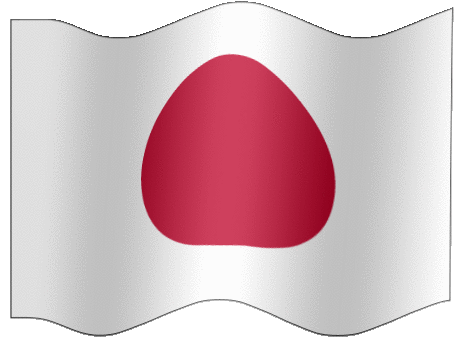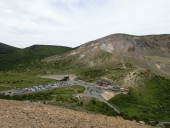 |
 |
 |
Let's be more moved - turn a trip of sights into a trip of feeling!

|
|
|
  |
FUKUSHIMA
|
| Free estimates Free travel consultation |
|
|
|
|
|
|
| #07F201 |
|
|
|
|
|
| IWAYA Rock-carved Buddhas |
rock-carved Buddhas statue on the mountainside |
|
|

Mt. Shinobu in the city center, there are over 60 rock-carved Buddha statues
carved into the cliffs on the eastern side. They include the Thirty-three
Kannon Bodhisattva, Jizo Bodhisattva, and Fudo Myo-o. Many of the statues
have weathered over the years, but you can still see the serene Buddha
images. Iwaya Kannon is said to have originated as a Kannon hall carved
out of rock by a powerful clan that ruled the area from the Heian to Kamakura
periods, after which an independent Kannon hall was built. |
 |
|
|
|
|
|
|
|
| #07F401 |
|
|
|
|
|
| Fruits Roads in FUKUSHIMA |
known for its delicious fruits |
|
|
|

In the western part of Fukushima City, there is a Fruit Road, affectionately
known as the "Fruit Line" and "Peach Line", lined with
tourist orchards and direct sales fruit shops. Starting with cherries in
June, you can enjoy seasonal fruits for about half a year, including peaches,
grapes, pears, and apples. There are many tourist orchards along the Fruit
Line and Peach Line, so you can enjoy fruit picking. Scissors and other
tools needed for fruit picking are available to rent on-site. Many orchards
offer all-you-can-eat for 30 minutes (for a fee), and there is an additional
charge for taking fruits home. |
 |
|
|
|
|
|
|
|
| #07F202 |
|
|
|
|
|
| TSUCHIYU Hot Spring |
a historic hot spring resort |
|
|
|

It has a history of over 1,400 years as a hot spring resort that also served
as a post station on the Aizu Kaido road (Tsuchiyu Kaido road) that ran
from Fukushima Castle Town to Aizu. It is now located along National Route
115 (Tsuchiyu Kaido road), the shortest route from the prefectural capital
Fukushima City to the Aizu region. Tsuchiyu Onsen has many hot springs,
and you can enjoy hot springs with more than 10 different types of spring
water. The hot spring area is located at an altitude of about 450 meters
and is surrounded by mountains, and the entire hot spring area is designated
as a national park. The local Tsuchiyu Kokeshi dolls are also a representative
local toy of Fukushima City, and it is also known as the production area
of "Japan's Three Great Kokeshi Dolls". |
 |
|
|
|
|
|
|
|
| #07F402 |
|
|
|
|
|
| ENBAN GYOZA |
disk-style dumplings |
|
|

A fried dumplings that are made into a round disk shape by lining them
up in a single frying pan and frying them. The roots of Fukushima's enban
gyoza go back to the chaotic period after the world war 2. A people who
came back from Manchuria in China to Fukushima City created a local dumpling
called "Fukushima Enban Gyoza (disk-style dumplings)" through
repeated trial and error. In order to cook many dumplings at once, the
dumplings are arranged according to the shape of the frying pan, and when
they are cooked, the frying pan is turned over and the dumplings are placed
on a plate, so the dumplings are arranged in a disk shape. Each store offers
its own unique dumplings nowadays.Takeout available. |
|
|
|
|
|
|
|
|
| #07F203 |
|
|
|
|
|
| FUKUSHIMA Prefectual Museum of Art |
an Art Museum in Fukushima |
|
|

Fukushima Prefectual Museum of Art is located at the foot of Mt. Shinobu (a symbol mountain of Fukushima City), alongside the Fukushima Prefectural Library. It opened in 1984 on the former site of the Campus of the Economics of Fukushima University.
It is close to Fukushima Station and has good transport access, yet is
in a quiet, tranquil environment. It houses over 1,600 works of art, including
paintings, prints, sculptures, and crafts, and is characterized by its
collection of 20th century American figurative paintings, as well as the
work of printmaker Saito Kiyoshi, painter Sekine Shoji. and so on. |
 |
|
|
|
|
|
|
|
| #07F101 |
|
|
|
|
|
| JODODAIRA Plateau |
a marshland surrounded by mountains |
|
 |

Located at an altitude of 1600m, the area is surrounded by volcanic desert
and virgin coniferous forests, mainly Abies mariesii. Many alpine plants,
coniferous forests, and marshes are also scattered here and there. A visitor
center, rest areas, and nature trails have been established, and various
levels of activities are available, from an hour's hike starting from here
to full-scale trekking. When the mountain tourist road named Bandai-Azuma
Skyline opens from April to mid-November, you can easily enjoy the subalpine
nature. It is not only a great place for daytime activities, but also a
great place for stargazing. In 1993, the Jododaira Astronomical Observatory,
the highest public observatory in Japan, was established. |
 |
|
|
|
|
|
|
|
| #07F102 |
|
|
|
|
|
| a Lake called "the Witch's Eye" |
a cobalt blue lake |
|
|
|

This is a crater lake on the mountainside of Mt. Issaikyozan in the Azuma
Mountain Range. Official name is "Goshikinuma" (different from
Goshikinuma in Urabandai, Fukushima Pref.), but it is also called "Witch's
Eye" because it has a beautiful cobalt blue color, and the water fills
a crater about 300m in diameter, and its color changes from moment to moment
depending on the sunlight. You can get to "Witch's Eye" by walking
about 90 minutes from Jododaira on the Bandai Azuma Skyline, which can
be reached by car, and you can view it from the summit of Mt. Issaikyozan
at an altitude of 1,949m. There is no path that leads directly down to
the shore of the lake from the summit. It is a sight you will never forget
once you see it. BTW, don't forget that it is a bear habitat! |
 |
|
|
|
|
|
|
|
|
|
|
|
|
|
|
|
|
|
|
|
|
|
|
|
|
|
|
|
|
|
|
|
|